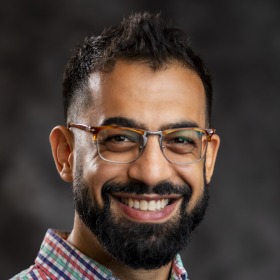
1226 Park St.
Grinnell, IA 50112
United States
Josh Marshack
On leave 2023–24 academic year.
Joshua Marshack is a biological anthropologist who uses our closest living relatives, the great apes, as a jumping-off point to study the evolution of social behavior, elucidate the origins of status changes in humans, and challenge biological determinism and scientific racism. He has published on the social behavior and ecology of wild savanna chimpanzees, as well as on the evolution of lethal aggression. He enjoys working with students seeking answers to big questions about the past to better shape our future.
Marshack’s research centers on the behavioral ecology of chimpanzees and bonobos, specifically the processes by which social thresholds are breached and relationships re-shaped. He has conducted fieldwork on wild chimpanzees in the Republic of Senegal, at a site called Fongoli, and captive research on bonobos at the Ape Initiative in Des Moines, Iowa. Focusing on the way social order is changed, maintained, and subverted in the genus Pan, he seeks to learn what light these socio-spatial patterns shed on the origins of status transitions in humans. Exploring the effects of habitat disturbance on social instability and lethal aggression, he hopes to apply his research to improving primate conservation.
Through research and teaching interests extending beyond environmental sustainability and animal behavior, he is interested in tracing the processes by which societies naturalize various inequities, in the process obscuring their causes.
As a Black, Jewish, and multi-ethnic scholar, Marshack prioritizes exploring topics from multiple perspectives, and he asks students to explore a range of means in sharing their research and analysis. In his classes, the activities and projects have included observational data collection at zoos and on farms, investigating nonhuman primate and human adaptations through laboratory sessions, archival and museum research on the history of scientific racism, 3D printing of dioramas, and podcast and infographic production.
In today’s economic climate, students may find themselves switching careers several times over the course of their lives. For this, a liberal arts education can be invaluable. Anthropology, as both a social and biological science, can model the necessary flexibility. With courses grounded on experiential and place-based learning, Grinnell’s Department of Anthropology fosters intellectual diversity, social justice, and critical and creative discourse. Marshack is glad to be a part of it.
His courses include: Anthropological Inquiries: Human Natures (a four-field introductory course); Human Evolution; Primate Behavior and Taxonomy; War, Peace, and Human Natures; Anthropomorphisms; and Biological Determinism and the Myth of Race.
Education and Degrees
Ph.D. Anthropology, Washington University in St. Louis, 2016; A.M. Anthropology, Washington University in St. Louis, 2009; A.B. Anthropology (with College Honors), Washington University in St. Louis, 2007
